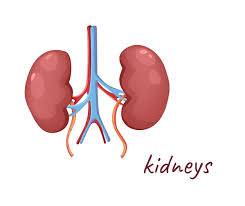The pair of kidneys one of the most important organs in our body. It is commonly known for its excretory function – filtering 200 litres of blood daily to produce around 2 litres of urine.
It is an important organ in maintaining human body’s blood pressure, electrolyte balance and calcium level. In Asia, the incidence of all kidney diseases is surging in recent years. More than 14% of Asian population is affected by chronic kidney disease, compared to 10% worldwide.
Kidneys are prone to direct damage from toxins like heavy metals, chemotherapy medications, and some antibiotics, which causes acute kidney injury and results in compromised kidney function. In the meantime, they are also prone to long term damage from daily routines. Here are 3 ways you are hurting your kidneys:

Figure 1. Kidneys
PSA: Medical Channel Asia (MCA) is now on Telegram! Join us here https://t.me/MedicalChannelAsia for daily reads and the latest updates at your fingertips!
1. High salt diet
One of kidney’s routine function is to excrete extra salt from blood to urine, and maintain a healthy balance of sodium and potassium in blood. When salt level increases in blood, kidneys tend to excrete less water, in order to lower the salt concentration. With less urination, our blood pressure would increase. The process also put kidneys under extra workload, which speeds up its ageing process.
- Healthy salt intake: The recommended daily intake of salt for adults daily is 6 grams. This is about one teaspoon of salt.
- Food high in salt:
- Most processed food
- Cereals and bread: they taste bland but could have high levels of salt
- Fast food
- Heavily sauced food: most cooking sauces have high salt level
- Tips to reduce salt intake:
- Check ingredients label before purchasing food.
- Use more herbs and spices: train your tastebuds to enjoy food with less salt. Basil, coriander, chilli, pepper, lemongrass and paprika can offer you a wide variety of food flavour.
- Fresh food like fruit, vegetables and wholegrain bread are almost always low in salt.
2. High sugar diet
High blood sugar level directly contributes to obesity, many cardiovascular conditions and greatly increases risk of developing kidney conditions. Diabetes, a metabolic condition whereby your body is unable to clear excess sugars, is one of the most common causes of chronic kidney disease. Kidneys function to remove excess sugar in blood and maintain it in a healthy range. High blood sugar level increases kidneys workload and lead to clogging of kidney blood vessels.
- Healthy sugar intake: It is recommended that the daily sugar intake for adults should not exceed 10% of our daily energy intake. For women, that is about 6 teaspoons (= 24 grams) sugar, and for men it is about 9 teaspoons (= 36 grams) of sugar.
- Food high in sugar:
- Most processed food
- Soft drinks
- Most types of desserts, such as ice cream and cake also contains high amounts of sugar
- Tips to reduce sugar intake:
- Check ingredients label before purchasing food.
- Avoid soft drinks and other sugary drinks as much as you can
- Use artificial sweetener to replace sugar
- Eat whole foods: unprocessed or unrefined food are usually low in sugar
3. Poor sleep
Though seemingly unrelated, a good night’s sleep is extremely important for kidney health. Kidney function is regulated by the sleep-wake cycle, which helps coordinate the kidneys’ workload over 24 hours. Recent studies have concluded that short sleep and long sleep duration, as well as poor sleep quality were associated with the incident development of chronic kidney disease.
- Healthy sleeping habits:
- Set consistent sleep schedule
- Sleep at least 7 hours a day
- Avoid mental stimulants like exciting music, movies, gaming etc. before bedtime.
- Avoid coffee and caffeine-based beverage
- Use bedroom for sleeping only
- Take regular exercise
- Maintain healthy diet
